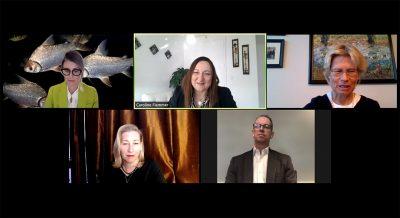Global warming continues to impact the world, and large corporations with hefty fossil fuel emissions are often criticized for exacerbating the crisis. But now, many businesses are joining the climate movement themselves by prioritizing environmental sustainability.

Why the businesses are motivated to do so — and if their actions will be enough — is up for debate.
Boston University Alumni and Friends held an online panel Jan. 21 titled “The Sustainability Imperative” with four alumni experts to discuss how larger corporations are adapting to a market that will hold them accountable for their carbon footprints.
Panelist Wendy Nystrom, 1996 alumna of the College and Graduate School of Arts and Sciences, is an environmental risk management and sustainability expert. She said she has seen corporations shift to eco-friendly platforms to satisfy the public and stakeholders.
“People are now paying attention and holding them to task.” Nystrom said at the event. “That’s personally, for me, the most important factor because people will follow money. It’s always been that way.”
CAS and Questrom School of Business 1994 alumnus Stephen Franco, managing director for Bank of America, said environmental, social and governance — ESG — investment has played an increasingly significant role in corporate business.
“I invest in companies that have better ESG performance and policies, and our investment thesis is that those companies are better able to compete and build long-term sustainable business models,” Franco said at the event, “and ultimately drive more profitability and better returns for investors.”
Franco added companies and large investment banks have increased pressure on corporations to disclose their environmental and social performance numbers.
“Overall, ESG criteria has been a significant driver about performance in the stock market,” Franco said. “Shareholders are now holding them accountable on the ESG criteria because they believe it improves investing returns, and now those companies have changed their behavior.”
Global climate change awareness has undoubtedly changed the face of many industries, the panelists said.
College of Engineering 1990 alumna Deborah Caplan, executive vice president of human resources and corporate services for NextEra Energy, Inc., said the market for clean energy in the corporate world has never been stronger. Caplan said businesses are realizing how profitable renewable energy is, which can now be achieved at a lower cost.
“The opportunity for the corporate world,” Caplan said at the event, “is really the fact that the demand for clean energy and a clean environment and for sustainable solutions has never been greater.”
However, despite corporations’ pledge to environmental responsibility, it is not always clear which changes are genuine and which are performative.
Large companies often practice “greenwashing” — purposefully deceiving the public by claiming their business practices are environmentally ethical — which was discussed during the panel.
Nalin Kulatilaka, a professor of finance in Questrom and affiliated faculty with BU’s Institute for Sustainable Energy, said greenwashing can happen when corporations release incomplete data on their contributions to pollution.
“You typically look at only the emissions that are within the control of a firm, so what comes out of your chimneys and what gasoline you burn,” he said in an interview. “Those are called phase one emissions.”
Phase two emissions, Kulatilaka said, are products people buy that somewhat indirectly emit pollutants, such as buying a seat on a train. Phase three emissions are pollutants “embedded” in a company’s products and are much more difficult to measure, he said.
“There’s been a tendency for a lot of large corporations who are under the spotlight to push a lot of the dirty stuff into these deep supply chain partners,” Kulatilaka said.
Whether or not corporations are committed to protecting the environment, many activists are determined to hold businesses accountable for their pollution.
Questrom junior Nicole Levine said she was optimistic about corporations’ new commitment to eco-friendly business, but large conglomerates have more actions steps they need to take.
“I don’t think they’re moving with a fast enough pace,” Levine said. “If they really wanted to do this, they could, more than likely.”


























































































































